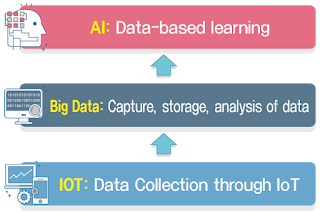AI / Big Data / IoT
Information Technology continues its run as the fastest evolving industry in 2016. AI (Artificial Intelligence), Big Data and IoT (Internet of Things) are the hottest keywords in this industry.
In essence, those three
technologies are totally different from each other in terms of fundamental
technology but become very disruptive when they are harmonized (hereinafter
referred to as “a mixture”). So from this point of view AI, Big Data and IoT
are in complementary relation.
 |
| [IoT, Big Data and AI] |
Relations of the mixture
As described above, the
largest feeder of Big Data is IoT and AI is where the Big Data is utilized the
most. The output of AI is fed back to our practical life and IoT is used to
trace the result of it.
Virtuous circle of a mixture
 |
| [Virtuos circle of AI, Big Data and IoT] |
IoT works based on the following three parts.
●
Sensor part
●
Communication part
●
Control part (optional)
IoT, Internet of Things literally allows an object (Thing) to be
sensed and sends it through internet.
LPWA?
LPWA, standing for Low Power
Wide Area, is the communication part of IoT. It is a type of wireless
telecommunication network designed to allow long range communications at a low
bit rate among things (connected objects), such as sensors operated on a
battery (source: Wikipedia). The advent of LPWA is to address the following
technical requirements.
●
Low in power consumption: a battery life in excess of 10 years
●
Low device unit cost: cost under 5 dollars
●
Installation at a low cost
●
Stable and wide range coverage
●
Large-scale device connectivity
●
Bandwidth:
non-licensed bandwidth, a fraction of existing cellular mobile network
(LTE-MTC, NB-LTE)
The following is
comparison of LPWA and other mobile network such as WCDMA / LTE.
LPWA Contenders
Since 2010 LPWA has
brought up commercialization issue in earnest. Each LPWA contender has its own
characteristic and standard status.
Among the above, there are a few LPWA contenders that currently talk
about their commercialization globally. See below table.
James’s thoughts on LPWA
LPWA is a big trend that no one can go against. Without
IoT, nobody can talk about either the 4th industrial revolution or
Big Data, AI or all sorts of ICT products penetrating into our life.
Who is going to be a
winner of LPWA? Although it sounds discouraging, my personal prospective is
that everybody will be the winner in the next 3 years. Take telcos in Korea for
example, all of them going for LTE-M, LoRa, NB-IoT will be successful for the
following two reasons.
- IoT devices that need to be connected through LPWA network are in
great demand. (Hundreds of millions of devices by 2020 are expected in Korea
market)
- LTE-M, LoRa, NB-IoT narket segmentation by its own characteristic. (Select a network that fits for the IoT device)
In the era of LPWA network, I’m excited about how a mixture of AI /
Big Data / IoT will change the future. It would be fun, informative and marvelous!



Wow admin! An amazing way to help people. You have shared a very useful post I really love it keep going on, thanks for sharing such a wonderful post with us. I wanted to thank you for this websites! Thanks for sharing. Great websites!
ReplyDeleteVisit here for Product engineering Services.
Hii Guys..
ReplyDeleteI see your blog, your blog is very impressive. and it is very useful for my project. I have more Details of this Battery. Click below.
IoT LoRa
Reading your blog was a journey through a landscape of profound ideas. Your ability to weave facts with narrative is exceptional. It's not just a read; it's an experience to savor.
ReplyDeleteelectronic components shop near me
electronic parts
electrical components
electronics component suppliers
electronic component suppliers
Bilgi dolu bir içerik olmuş, devamını beklerim.
ReplyDelete